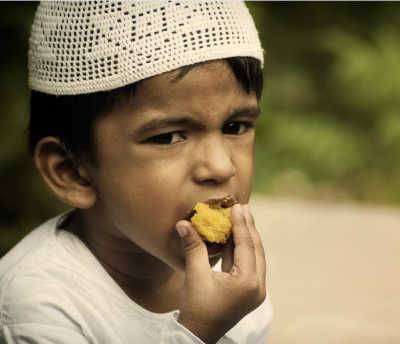
It seems like almost every religion has some practice of fasting as part of their traditions. But what’s the significance and importance of the religious practice of fasting?
What is religious fasting and why do it? Fasting is giving up something, usually food or drink, for a set amount of time. Religions all around the world fast for a variety of reasons include repentance, as an opportunity to think about the less fortunate, or just to test your willpower.
In this article you’ll learn what fasting is, how various religions around the world incorporate fasting, why you might want to fast, and how to give religious fasting a try for yourself.
What Is Fasting?
Fasting is choosing to intentionally deprive yourself of food or drink for specific period of time. In some traditions you can also do a type of fast by giving up something other than food or drink for a certain amount of time.
The extent of your fast will depend on your beliefs and what you’re trying to accomplish. For some fasts you are only allowed to eat before sunrise and after sundown. For other fasts you may only be allowed to drink water. And in the most strict type of fast called a dry fast or absolute fast, you abstain for any food or drink entirely.
From a medical perspective, some changes happen in your body if it’s been more than 8 to 12 hours since your last meal. Although some metabolic changes can start as soon as 3 to 5 hours after your last meal.
Intermittent fasting, water fasts, and juice fasts have become popular health crazes in recent years. They’re used almost exclusively for health and weight loss. But the practice of fasting actually goes back thousands of years.
Christian or Biblical Fasting
Many different Christian denominations observe fasting during different parts of the year. These include Catholics, Methodists, Anglicans, Lutherans, Orthodox churches, and more.
The most popular time to fast or “give something up” is during Lent, which is a 40 day period in the church calendar.
Some Catholics choose to abstain from eating meat on Fridays as well, and opt to only eat fish on this day, which isn’t considered a meat. Roman Catholics also typically fast for an hour before receiving the Eucharist.
Religious Fasting in Islam

For Muslims, fasting is about more than just what they eat or drink. Their fasts also include arguing, fighting, or lustful thoughts. As well as indecent speech or telling lies.
Ramadan is the most famous Muslim fasting period of the year, where Muslims seek to purify their soul, body, and mind. It’s believed this fast also increases their taqwa, which is similar in some ways to the Buddhist idea of karma. Ramadan lasts for one month and Muslims must fast from dawn until sunset.
Studies have been done on the effects of Ramadan fasting, and results include significant improvements in blood pressure, biomarkers of oxidative stress, and blood lipids.
Religious Fasting in Judaism
Unsurprisingly, Jews also participate in fasts, similar to Christians and Muslims.
There are typically 6 days of the year that a Jew fasts. Of these, Yom Kippur is the most important day of religious fasting for a Jew, as a way of repenting.
Religious Fasting in the Eastern Religions
Buddhists fast during times of focused meditation, especially at meditation retreats. During these fasts, Buddhists avoid eating all animal products except milk. They also avoid garlic and onions, and processed foods.
For more strict Buddhists, one of the precepts is to not eat after noon until the following morning.
Hindus also fast, typically on specific days of the month like Purnima, Ekadasi, and Pradosha. When one Hindu fasts may be different from another. For example, those who are worshippers of Vishnu usually fast on Thursdays, and devotees of Shiva will fast on Mondays instead.
Ever wonder what those necklaces and bracelets that Buddhists and Hindus wear are all about? Check out my other article, What Are Rudraksha Beads?
Why Should You Do Religious Fasting?
Depending on your religion, there may be any number of reasons why you might want to fast.
Repentance for sins and wrongdoings is typically a common reason of most faiths. As well as taking time to contemplate those who are less fortunate and might not be able to eat consistently every day.
Religious fasting is said to increase spiritual strength, and can even be used to break demonic bondage.
Wondering if demons are real? Check out my other article, Are Demons Real? (What You Should Know About Demons and The Devil)
It is also a way to test yourself and see what kinds of addictions and desires have power over you. You might not realize how much something like coffee or sugar is controlling your emotions and habits until you try to give it up for some period of time.

How To Do Religious Fasting Yourself
If you have never fasted before, it’s advised to start slow and progressively increase your fast. When you first start, it may be difficult just to give up one meal in a day. But over time you can build up the willpower and strength needed to fast for a full day.
Before you start any fast, it’s highly recommended to check with your doctor first and make sure it won’t negatively impact your health. This is particularly important for young children, the elderly, or the sick. It’s not advisable to stop taking your regular medication during a fast.
Usually it’s best to prepare yourself for your fast, both physically and mentally, by starting to eat a bit less for the week leading up to your fast. If you eat a huge meal the day before your fast, especially something very carb-heavy like a big pasta dish, you’ll often feel far more hungry and sluggish. So try to ease yourself into it over several days. If you’ve ever been too sick to eat for any period of time, you know how your stomach actually shrinks down and it takes less to feel full once you start eating again.
During your fast, keep drinking lots of water unless you’re doing a dry fast or absolute fast. It’s important to stay hydrated and it will also help you to feel a bit more full. If you’re able to have juice during your fast, it will help keep your blood sugar up and give you some energy. If you experience any side-effects of the fast like lightheadedness or headaches, or anything you’re unsure about, be sure to contact your doctor.
Be sure to have something to do instead of eating! Food is actually a pretty big part of most of our days. So fill that time with prayer or something else to take your mind off of it.
When it’s time to end your fast, it’s important to do this gradually as well. You don’t want to go out for a huge greasy dinner to end your fast. Start with small portions of food. Soups and juices are a way to get your body used to digesting food again. Then you can work your way up to fresh fruits and vegetables. Don’t hesitate to take a few days before you’re back to your normal diet, especially after an extended fast.

Conclusion
Fasting is an important act of devotion in a number of religions around the world. How you choose to participate in fasts, if at all, will depend on your specific faith, your health, and other factors.
Before starting any religious fast, it’s important to always check with your doctor to make sure there won’t be any unintended negative health consequences.
But as long as you’re healthy about it, fasting can be a great way to show devotion and put yourself more in touch with your spirituality.